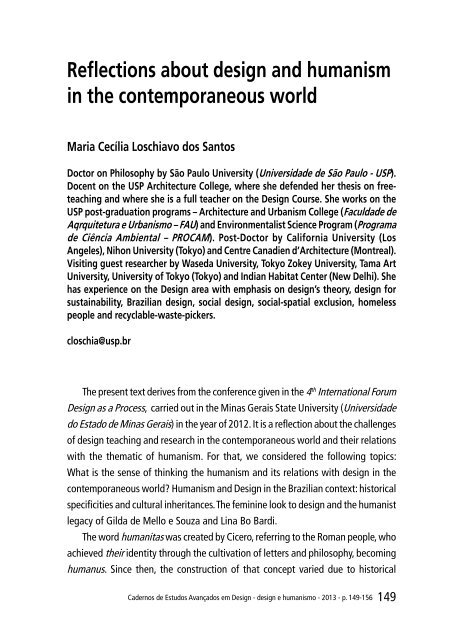o_19po8js951tvs1r0t1r8s4bb1vpla.pdf
You also want an ePaper? Increase the reach of your titles
YUMPU automatically turns print PDFs into web optimized ePapers that Google loves.
Reflections about design and humanism<br />
in the contemporaneous world<br />
Maria Cecília Loschiavo dos Santos<br />
Doctor on Philosophy by São Paulo University (Universidade de São Paulo - USP).<br />
Docent on the USP Architecture College, where she defended her thesis on freeteaching<br />
and where she is a full teacher on the Design Course. She works on the<br />
USP post-graduation programs – Architecture and Urbanism College (Faculdade de<br />
Aqrquitetura e Urbanismo – FAU) and Environmentalist Science Program (Programa<br />
de Ciência Ambiental – PROCAM). Post-Doctor by California University (Los<br />
Angeles), Nihon University (Tokyo) and Centre Canadien d’Architecture (Montreal).<br />
Visiting guest researcher by Waseda University, Tokyo Zokey University, Tama Art<br />
University, University of Tokyo (Tokyo) and Indian Habitat Center (New Delhi). She<br />
has experience on the Design area with emphasis on design’s theory, design for<br />
sustainability, Brazilian design, social design, social-spatial exclusion, homeless<br />
people and recyclable-waste-pickers.<br />
closchia@usp.br<br />
The present text derives from the conference given in the 4 th International Forum<br />
Design as a Process, carried out in the Minas Gerais State University (Universidade<br />
do Estado de Minas Gerais) in the year of 2012. It is a reflection about the challenges<br />
of design teaching and research in the contemporaneous world and their relations<br />
with the thematic of humanism. For that, we considered the following topics:<br />
What is the sense of thinking the humanism and its relations with design in the<br />
contemporaneous world? Humanism and Design in the Brazilian context: historical<br />
specificities and cultural inheritances. The feminine look to design and the humanist<br />
legacy of Gilda de Mello e Souza and Lina Bo Bardi.<br />
The word humanitas was created by Cicero, referring to the Roman people, who<br />
achieved their identity through the cultivation of letters and philosophy, becoming<br />
humanus. Since then, the construction of that concept varied due to historical<br />
Cadernos de Estudos Avançados em Design - design e humanismo - 2013 - p. 149-156<br />
149



